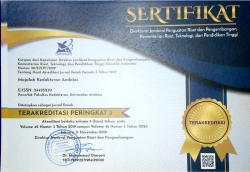Hubungan antara tumor-infiltrating lymphocytes dengan parameter klinikopatologi pada kanker kolorektal
Abstract
Latar Belakang: Kanker kolorektal termasuk dalam keganasan terbanyak di dunia. Berbagai faktor turut mempengaruhi prognosis dari kanker salah satunya sistem imun. Sistem imun di sekitar tumor memiliki pengaruh terhadap progesivitas sel kanker. Salah satu sistem imun yang dapat diamati adalah Tumor-infiltrating lymphocytes (TIL). Tujuan: Penelitian ini bertujuan untuk membuktikan adanya hubungan antara TIL dengan berbagai parameter klinikopatologi pada kanker kolorektal. Metode : Penelitian ini menggunakan desain potong lintang. Subjek penelitian berupa 38 sampel blok parafin dan slide hematoksilin-eosin (HE) serta data klinikopatologi yang berasal dari sediaan operasi kanker kolorektal pada Laboratorium Patologi Anatomi RSUD Dr. Soedarso periode Januari – Desember 2020. Penilaian jumlah TIL dibagi menjadi tiga kelompok yaitu ringan (0-10%), sedang (11-59%), dan berat (60-100%). Hasil: Hasil penelitian menunjukkan bahwa jumlah TIL terbanyak adalah TIL berat yaitu sebanyak 16 kasus (42,1%). Hasil uji korelasi Spearman menunjukkan hubungan antara jumlah TIL dengan derajat diferensiasi, stadium Dukes dan stadium p TNM dengan nilai p<0,005. Tidak terdapat hubungan antara jumlah TIL dengan ukuran tumor, status metastasis kelenjar getah bening, status metastasis jauh, dan lokasi tumor. Kesimpulan: Terdapat hubungan antara jumlah TIL dengan derajat keganasan, stadium Dukes dan stadium pTNM yang merupakan faktor-faktor prognosis pada kanker kolorektal.
Keywords
Full Text:
PDFReferences
International Agency for Research on Cancer. Number of new cases worldwide in 2018. Globocan. 2020
Zhao Y, Ghe X, He J, Cheng Y, Wang Z, Wang J, et al. The prognostic value of tumor-infiltrating lymphocytes in colorectal cancer differs by anatomical subsite: a systematic review and meta-analysis. World Journal of surgical Oncology. 2019; 17(85): 1-11.
Shibutani M, Maeda K, Nagahara H, Fukuoka T, Iseki Y, Matsutani S, et al. Tumor-infiltrating lymphocytes predict the chemotherapeutic outcomes in patients with stage IV colorectal cancer. in vivo. 2018; 32: 151-8.
Dieci MP, Radosevic-Robin N, Fineberg S, van den Eyden G, Ternes N, Penault-Llorca F, et al. Update on tumor-infiltrating lymphocytes (TILs) in breast cancer, including recommendations to assess TILs in residual disease after neoadjuvant therapy and carcinoma in situ: a report of the international immuno-oncology biomarker working group on breast cancer. Seminars in Cancer Biology. Elsevier Ltd. 2017: p.1-10.
Hendry S, Salgado R, Gevaert T, Russell PA, John T, Thapa B, et al. Assessing tumor-infiltrating lymphocytes in solid tumors: a practical review of pathologists and proposal for a standardized method from the international immunooncology biomarker working group: part 1: assessing the host immune response, TILs in invasive breast carcinoma and ductal carcinoma in situ, metastatic tumor deposits and areas for futher research. Adv Anat Pathol. 2017; 00(00): 1-17.
Denkert C, Loibl S, Noske A, Roller M, Muller BM, Komor M, et al. Tumor-associated lymphocytes as an independent predictor of response to neoadjuvant chemotherapy in breast cancer. J Clin Oncol.2010; 28: 105-13.
Ghanadan A, Ehsani A-H, Farahmand A-M, Mirzaei M. Tumor infiltrating lymphocytes in different stages of malignant melanoma and correlation with tumor stage and other prognostic factors: a retrospective multicenter study. Middle East J Cancer. 2017; 8(4): 207-12.
Iseki Y, Shibutani M, Maeda K, Nagahara H, Fukuoka T, Matsutani S, et al. A new method for evaluating tumor-infiltrating lymphocytes (TILs) in colorectal cancer using hematoxylin and eosin (H-E)- stained tumor sections. PLoS ONE. 2018; 13(4): 1-12.
Xie Q-K, He W-Z, Hu W-M, Yang L, Jiang C, Kong P-F, et al. Tumor-infiltrating lymphocyte as a prognostic biomarker in stage IV colorectal cancer should take into account the metastatic status and operation modality. Cancer Management and Research. 2018; 10: 1365-75.
Marley AR, Nan H. Epidemiology of Colorectal Cancer. Int J Mol Epidemiol Genet. 2016; 7(3): 105-14.
Lu B, Luo C-Y, Cai J, Lu M, Zhang Y-H, Chen H-D, et al. Colorectal cancer incidence and mortality: the current status, temporal trends and their attribute risk factors in 60 countries in 2000-2019. Chinese Medical Journal. 2021; 134(16): 1941-51.
Gandomani HR, Yousefi SM, Aghajani M, Mohammadian-Hafshejani A, Tarazoj AA, Pouyesh V, et al. Colorectal cancer in the world: incidence, mortality and risk factors. Biomed Res Ther. 2017; 4(10): 1656-75.
Vuik FER, Nieuwenburg SAV, Bardou M, Lansdorp-Vogelaar I, Dinis-Ribeiro M, Bento MJ, et al. Increasing incidence of colorectal cancer in young adults in Europe over the last 25 years. Gut. 2019; 68: 1820-26.
Huyghe JR, Harrison TA, Bien SA, Hampel H, Figueiredo JC, Schmit SL, et al. Genetic architectures of proximal and distal colorectal cancer are partly distinct. Gut. 2021;70: 1325-34.
Baran B, Ozupek NM, Tetik NY, Acar E, Bekcioglu O, Baskin Y. Difference between left-sided and right-sided colorectal cancer: a focused review of literature. Gastroenterol Res. 2018; 11(4): 264-73.
Huh JW, Lee JH, Kim HR. Prognostic significance of tumor-infiltrating lymphocytes for patients with colorectal cancer. Arch Surg. 2012;147(4):366-71.
Ko YS, Pyo J-S. Clinicopathological significance and prognostic role of tumor-infiltrating lymphocytes in colorectal cancer. The International Journal of Biological Markers. 2019;34(2):132-38.
Jimenez-Rodriguez RM, Patil S, Keshinro A, Shia J, Vakiani E, et al. Quantitative assessment of tumor-infiltrating lymphocytes in mismatch repair proficient colon cancer. OncoImmunology. 2020; 9(1): 1-8.
Fuchs TL, Sioson L, Sheen A, Jafari-Nejad K, Renaud CJ, Andrici J, et al. Assessment of tumor-infiltrating lymphocytes using International TILs Working Group (ITWG) system is a strong predictor of overall survival in colorectal carcinoma. Am J Surg Pathol. 2020; 44(4): 536-44.
Matsusani S, Shibutani M, Maeda K, Nagahara H, Fukuoka T, Iseki Y, et al. Verification of the methodology for evaluating tumor-infiltrating lymphocytes in colorectal cancer. Oncotarget. 2018; 9(20): 15180-97.
Ravelli A, Roviello G, Cretella D, Cavazzoni A, Biondi A, Cappelletti R, et al. Tumor-infiltrating lymphocytes and breast cancer: beyond the prognostic and predictive utility. Tumor Biology. 2017: 1-8.
Mohamed M, Sarwath H, Salih N, Bansal D, Chandra P, Husain NE, et al. CD8+ tumor infiltrating lymphocytes strongly correlate with molecular subtype and clinocopathological characteristics in breast cancer patients from Sudan. Translational Medicine Communications. 2016; 1(4): 1-6.
Shen M, Wang J, Ren X. New insights into tumor-infiltrating B lymphocytes in breast cancer : clinical impacts and regulatory mechanisms. Front Immunol. 2018; 9(470): 1-8.





















